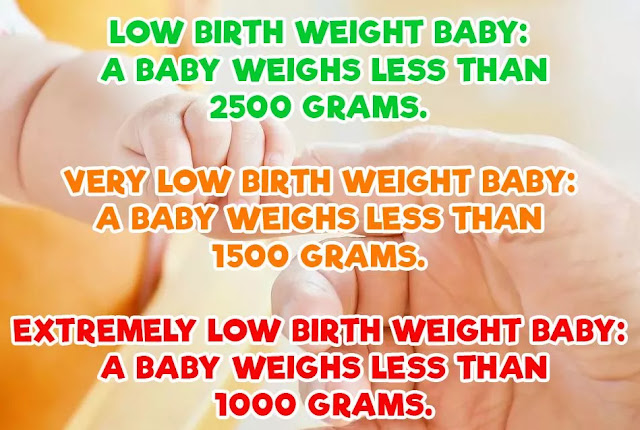8 Things to Know About Low Birth Weight Babies

According to the Lucile Packard Children’s Hospital at Stanford, over 8% of all babies born in the U.S.A. each year have low birth weight.
The number is increasing, potentially because of the rise of multiple births.
Developing countries have much higher incidences of babies with low birth weight.
While it might be scarier to have a baby at low birth weight and care for him or her, there aren't many differences in your day-to-day care of your newborn baby.
However, family members of a low birth weight baby need to be extra watchful to ensure the baby stays healthy.
1- What Do We Mean by Low Birth Weight Baby?
Low birth weight is defined by the World Health Organization as a birth weight of an infant of 2,499 g or less,regardless of gestational age(the number of weeks of pregnancy). Low birth weight babies look smaller than other babies of normal birth weight.
Ahead of low birth weight baby may appear to be bigger than the rest of the body, and he or she often looks thin with not much body fat.
A low birth weight baby might be healthy even though he or she is small, but a low birth weight baby can also have many serious health issues.
2- What are The Types of Low Birth Weight Babies?

There are three categories of a low birth weight baby:
Low birth weight baby: A baby weighs less than 2500 grams.
Very low birth weight baby: A baby weighs less than 1500 grams.
Extremely low birth weight baby: A baby weighs less than 1000 grams.
3- What Causes Low Birth Weight Babies?
Babies are born small for two main reasons:The primary cause of low birth weight baby is premature birth (being born too early), being born before 37-week gestation.
Being born early means a baby has less time in the mother's uterus (the mother's womb) to grow and gain weight.
Most of a baby's weight is gained during the latter part of pregnancy.

The other cause of low birth weight is intrauterine growth restriction.
This happens when a baby does not grow well during pregnancy because of problems with the placenta, the mother's health, or the baby's condition.
Also, there are some other conditions can cause your baby to be born with low birth weight,
such as problems with the birth mother’s placenta, complications with the birth mother’s pregnancy, birth defects, and poor maternal nutrition,
maternal drug or alcohol abuse, or incomplete prenatal care can also raise your risk of having a baby with low birth weight.
4- Are There Any Other Factors Causing Low Birth Weight?
There are other factors that can contribute to the risk of having a baby with low birth weight:- Race - African-American babies are twice as likely to have low birth weight as Caucasian babies.
- Mother's age - Teen mothers (especially younger than 15) have a much higher risk of having a baby with low birth weight.
- Multiple births - Multiple births babies are at increased risk of low birth weight because they often are premature.
- Mother's health - Babies of mothers who are exposed to drugs, alcohol, and cigarettes are more likely to have a low birth weight.
- Lower socioeconomic status mother, who is having a baby, are more likely to have poorer pregnancy nutrition,
insufficient prenatal care, and pregnancy complications.
Also, you can read What is the Right Way To Measure Newborn length
5- How is Low Birth Weight Diagnosed?
The main reason for regular prenatal exams is to make sure you are having a baby who is growing well.During good prenatal care, your doctor should monitor your baby’s approximate size and weight.
This can help your doctor identify a potential case of low birth weight before your baby is born.
The height of the fundus (the top of a mother's uterus) c0uld be measured from the pubic bone.
This measurement in centimeters usually corresponds with the weeks of pregnancy after the 20th week.
If it is low for the number of weeks, the baby may be smaller than expected.
Ultrasound (a test using sound waves to create a picture of internal structures) is a more accurate method than estimating fetal size.
Measurements can be taken of the baby's head, belly (abdomen), and upper leg bone (femur).
These measurements are used to estimate the baby’s weight.
6- What are the Potential Health Risks for Babies with Low Birth Weight?
Low birth weight can affect almost every organ in the body.
They might have issues with their lungs, intestinal tract, vision and hearing, and future developmental delays.
Some of these problems will get better, but some might be lifelong. If your baby is born with low birth weight,
they’ll have a higher risk of developmental difficulties, health complications, and premature death than babies born at a normal weight.
They may be weaker, have trouble eating, gaining weight, staying warm, and fighting illness and infections.
Some common health complications associated with low birth weight include underdeveloped lungs or other organs,
respiratory problems, digestive problems, neurological problems, eye or ear problems, and sudden infant death syndrome (SIDS).
7- How is Baby Low Birth Weight Treated?
Treatment will depend on the baby’s symptoms, age, and general health.If they’re born with low birth weight, they may need to stay in the hospital until they gain enough weight to be discharged.
If the babies showed other complications, such as intestinal issues 0r underdeveloped lungs,
they will probably need to stay in the hospital until the complications have been addressed through medical care.
According to the World Health Organization, babies with low birth weight should be fed with their mother’s breast milk whenever possible.
Breastmilk (and breastfeeding if possible) could help promote growth and weight gain. If their birth mother’s breast milk isn’t available, human donor milk might be used.
Treatment for low birth weight often includes:
care in the neonatal intensive care unit (NICU), temperature-controlled bed and special feedings.
In addition, babies may be referred to as special follow-up healthcare programs.
8- How is Baby Low Birth Weight Prevented?
Prevention of preterm births is one of the best ways to prevent having a baby born with low birth weight.Good prenatal care is a key factor in preventing preterm births and low birth weight babies.
The health of both mother and baby can be checked at prenatal visits.
Because maternal nutrition and weight gain are linked with baby weight gain and birth weight.
Furthermore, eating a healthy diet and gaining the proper amount of weight in pregnancy is essential.
Mothers should avoid alcohol, cigarettes, and drugs, which can contribute to poor baby growth, among other complications.
Sources






